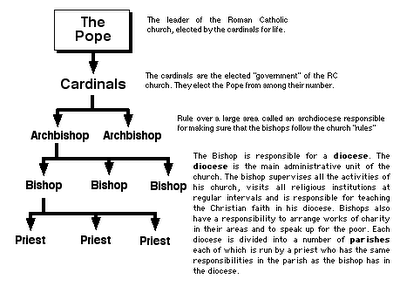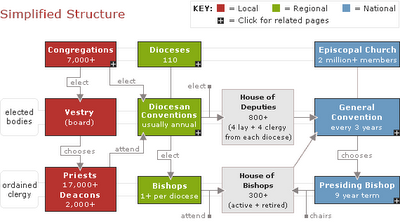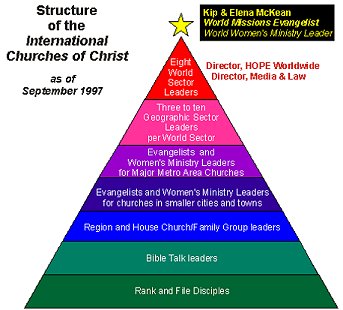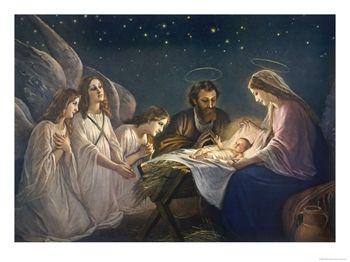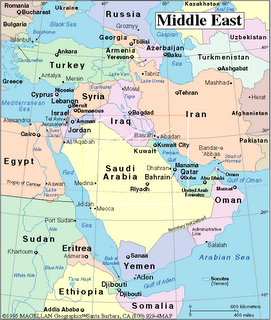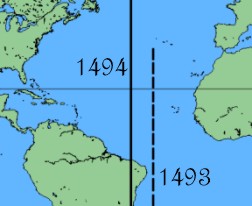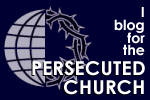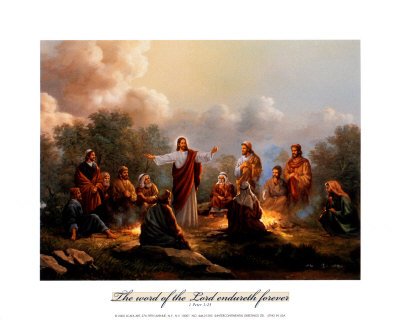
There has been one TV preacher that I have learned from and respect, and believe me that is rare. The Holy Spirit has obviously come out of this man and here is one of his best teachings...
CLAIMS THAT JESUS MADE
Regardless of the source, the only Jesus in history will be found
making one or more of the following claims.
a)Jesus spoke that He would be killed but would rise on the
third day. (Mark 10:33-34; Matthew 20:19)
b)He spoke that He had been sent to save the world and
salvation came only from believing in Him. (John 3:16-18)
c)Something was wrong with the whole world that could only
be set right by his death being a "ransom". (Matthew 20:28)
d)He spoke of God as His Father and that men should honor
the Son as they honored the Father. (John 5:23)
e)He spoke that those who believed in Him would have
everlasting life. (John 14:6)
f)He claimed to be the Son of God. (John 9:35-37)
g)He spoke that no man could come to the Father except
through Him. (John 14:6)
h)He spoke in His teachings of heaven and eternity from
the inside. "I saw Satan cast down." (Luke 10:18)
And, "Before Abraham, I was." (John 8:58)
And, "There is joy in heaven by the angels when a
sinner repents." (Luke 15:10)
i)He spoke that He was to be the judge of all things
including man. (John 5:22)
j)Jesus thought of Himself as perfect by presuming himself
adequate to forgive sin (Matthew 9:6) and be the redeemer and
Savior of mankind (Matthew 16:16-17).
It doesn't matter whether he was perfect, he thought he was
and it is not man's nature to accept someone who thinks of
himself as perfect. Mankind certainly does not make saints of
people who think they're perfect.
So from the claims that Jesus made one can only conclude that:
a) Jesus was a liar and a fraud or
b) He was who and what He claimed to be.
c) A GOOD AND WISE TEACHER
Some say that Jesus was a "good and wise teacher". One can be wise
and be a liar which only makes him a "good" liar. One can be good
and lie without the realization that he is lying in which case he
cannot be wise.
Therefore, one cannot call Jesus both "good and wise" without
accepting that He was what He said He was.
CAN JESUS BE "JUST" A PROPHET
The claims that Jesus made suggest that He considered Himself more
than a prophet. A mere prophet from God would never make the
statement that he "should be afforded the same honor as the one (God)
who had sent him" and mere prophets do not claim that they can forgive
sin. Therefore, if one is to afford Jesus the status of being one
of "God's prophets" then all the other claims that Jesus made should
be accepted as well.
THE RESURRECTION IS THE KEY
One of the qualifications of a prophet is his predictions must be
verifiable by witnesses. We tend to focus on the "long term"
prophecies of the Prophets of old as these are the ones most
relevant to us.
Short term prophecies, those that can be verified during the "time"
of the prophet, are important because they serve to identify him
immediately as a prophet and thus give credibility to his longer
term predictions.
The following verse in the Gospel of Mark obviously qualifies
as a "short term" prediction or prophecy from Jesus. One that could
be verifiable in His "time".
(Mark 9:31) For he taught his disciples, and said unto them,
"The Son of man is delivered into the hands of men, and they shall
kill him; and after that he is killed, he shall rise the third day."
The portion of this prediction of significant importance is Jesus'
claim that after being killed He would "rise on the third day".
It's obvious that a miracle from God must occur for this prediction
to come to fruition.
Thus, the Resurrection is the key to determining whether the claims of
Jesus were just a bunch of lies or if He was who He said He was.
THE FACTS
To argue His resurrection one must begin with some general assumable
facts. i.e. we can't argue a resurrection took place unless
we first assume "a life and a death were present" prior to the
resurrection. The following not only are recorded in the scriptures
but are easily backed up by the writings of historians of the period.
(i.e. Josepheus).
1)Jesus lived.
2)He was crucified and considered dead.
3)He was buried in a known accessible tomb.
4)The tomb was found to be empty on the third day.
5)It was preached (by the disciples) that He had was raised up
and had ascended to Heaven.
6)The Jewish leaders who instigated the crucifixion would
be most interested in disproving the resurrection even more
than we would today.
7)The early Church leaders (the disciples) were persecuted for
preaching the resurrection message.
8)The tomb was found empty.
COMMON ARGUMENTS AGAINST RESURRECTION
1)The disciples stole the body of Jesus.
2)The Romans stole the body.
3)The Jewish leaders stole the body.
4)The women went to the wrong tomb.
5)He (Jesus) wasn't really dead when he was placed in
the tomb and He resuscitated
6)Everyone was hallucinating.
7)The disciples made the whole thing up and were lying
when they preached the resurrection.
8)It's all true. The disciples are telling exactly what
they saw and experienced.
a)Had the Romans or the Jews stolen the body (arguments 2 & 3),
they could easily have disproved the Resurrection and expose Jesus
as a fraud by simply producing the body if they were in possession of it.
b)Had the women gone to the wrong tomb (argument 4) they would have
simply kept looking until they found the right one.
c)No one ever survived a Roman crucifixion (argument 5).
Further, John reports (John 19:34) that Jesus was pierced with a
Roman spear as a final gesture to assure His death.
d)Hallucinations are temporary and do not change reality.
If it had just been hallucinations, there would have been a body in
the tomb. (argument 6).
e)The only arguments remaining center on the disciples.
Specifically, the disciples were either telling the truth when they
preached the crucifixion and Resurrection of Jesus or they were
preaching lies.
A LOOK AT THE DISCIPLES
Prior to the death and resurrection of Jesus the disciples were
disorganized in their understanding of the teachings of Jesus.
Peter was unstable in his faith as evidenced by his three denials
of Jesus. (Matthew 26:70-75). John was harsh and selfish to an extent
that Jesus actually referred to John and James as "the sons of thunder"
(Mark 3:17). Thomas was always filled with doubt.
Cowards, fearing for their own lives, all the disciples with
the exception of John, deserted Jesus when He was arrested and carried
away to be crucified. It appears that John was the only disciple that
was present at the crucifixion.
The disciples underwent cataclysmic changes after the Resurrection. They
show consistency in their understanding and preaching of what Jesus had
taught them. Peter became the epitome of stability within the Church.
John's ways were transformed from selfishness to loving and Thomas became
a full believer never to doubt again. Thomas preached in India which was
probably the most difficult "assignment" of all. Their cowardice was
transformed to that of courage as they preached throughout the "then known"
world.
THE FINAL ARGUMENT
Finally, to answer the question, "Were the disciples preaching lies or
were they telling what they knew to be the truth concerning the death and
Resurrection of Jesus".
The disciples were scattered throughout different countries as they
preached the Gospel. They preached alone not knowing if they would ever
see their fellow disciples again.
All the disciples, with the exception of John, were tortured, persecuted
and eventually put to death for preaching the resurrection. (The following
compilation is taken from Fox's Book of Martyrs by John Fox)
1)Peter was crucified in Rome.
2)Andrew was crucified in Edessa.
3)James was killed by the sword in Jerusalem.
4)Philip was crucified in Heliopolis, Phyrgia.
5)Bartholomew was beaten and crucified in India.
6)Thomas was speared by idolatrous priests in Parthia, India.
7)Matthew was axed to death in Nadabah, Ethiopia.
8)James (the son of Alphaeus) was clubbed to death in Jerusalem at the
age of 94.
9)Thaddaeus was crucified in Edessa.
10)Simon "Zeolotes" was crucified in Brittainnia.
11)Stephen was stoned to death and was the first to be martyred.
12)Paul (an apostle) was beheaded in Rome.
13)Matthias (an apostle) was stoned and beheaded in Jerusalem.
14)Mark (an apostle) was dragged to death in Alexandria.
15)Luke (an apostle) was hanged by priests in Greece.
Any of the disciples could have saved his own life by simply admitting
that he was preaching lies. Most likely none of the other disciples would
have ever known of such an admission since they were separated from the
others. Each of the disciples died alone.
Yet, not a single disciple retracted his story! They preached the death
and Resurrection of Jesus Christ even unto their own deaths. They preached
what they knew had happened. They were witnesses to the events that Jesus
had predicted. Jesus came out of the tomb as He said He would and since He
did then Jesus has to be everything He claimed He was.
Labels: bible study, Christian History, Christian Wisdom
